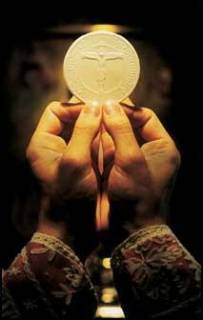Summorum Pontificum
We need to, as the pope said, make room for everything in our hearts that the faith allows. Let us rejoice at the latest movement of the Holy Spirit working through St. Peter, and offer a te Deum that the "big Church" just got a little bigger.
This article come from Catholic News Agency, and is a pretty good rundown.
************
Today marks the historic issuance of Pope Benedict’s apostolic letter on the use of the Roman Missal of 1962. The much talked about letter begins with the Pope giving a history of the use of the Roman Missal, and then provides, among other things, an explanation of the purpose of this Motu Proprio.Before launching into the history of the pre-Vatican II Missal, the Pope makes the distinction that while some believe that it was done away with by the liturgical reforms of Vatican II, this was never the case. “I would like to draw attention to the fact that this Missal was never juridically abrogated and, consequently, in principle, was always permitted.”
In order for his new letter to be understood correctly, Benedict XVI gives his readers some historical context.
Liturgical History
Some have argued that since no new norms were given for the use of the old Missal that it was de facto discarded. However, the Pope responded that, “At the time of the introduction of the new Missal, it did not seem necessary to issue specific norms for the possible use of the earlier Missal. Probably it was thought that it would be a matter of a few individual cases which would be resolved, case by case, on the local level.”
“Afterwards, however, it soon became apparent that a good number of people remained strongly attached to this usage of the Roman Rite, which had been familiar to them from childhood.”
Benedict also mentioned Archbishop Lefebvre, who led a breakaway group from the Church called the Society of St. Pius X. Amongst this group, “fidelity to the old Missal became an external mark of identity; the reasons for the break, which arose over this, however, were at a deeper level.”
Pope Benedict then described the turmoil surrounding the reform of Vatican II and the struggle of many of the faithful who wished to preserve the pre-conciliar Missal. “This occurred above all because in many places celebrations were not faithful to the prescriptions of the new Missal, but the latter actually was understood as authorizing or even requiring creativity, which frequently led to deformations of the liturgy which were hard to bear.”
On a personal note, the pontiff mentioned his own experience of the Vatican II “period with all its hopes and its confusion.” In addition, he said, “I have seen how arbitrary deformations of the liturgy caused deep pain to individuals totally rooted in the faith of the Church.”
Pope John Paul II’s Reforms
Given this painful context, Benedict XVI explained that John Paul II felt obliged to provide guidelines for the use of the 1962 Missal which came in the form of his Motu Proprio Ecclesia Dei (2 July 1988).
This document did not give specific instructions for the use of the Missal but only provided general guidelines for Bishops to allow this usage of the Roman Rite. At the time, the Pope primarily wanted to assist the Society of Saint Pius X to recover full unity with the Successor of Peter, and sought to heal a wound experienced ever more painfully.
“Unfortunately this reconciliation has not yet come about. Nonetheless, a number of communities have gratefully made use of the possibilities provided by the Motu Proprio.”
Reason for Benedict’s Motu Proprio
The main purpose of this Motu Proprio is to “provide precise juridical norms so that the Church can attain fuller unity” and “to free Bishops from constantly having to evaluate anew how they are to respond to various situations.”
The full text of the Motu Proprio can be found in our Documents section or by clicking here.
Summary of the Twelve Articles of Summorum Pontificum
The Roman Missal promulgated by Paul VI (Novus Ordo) is the ordinary form to be
used for the liturgy while the Missal promulgated by Pius XII and then by
Bl. John XXIII (Missal of 1962) is the extraordinary form. The 1962 Missal was never outlawed.
In Masses without the people, priests can use the 1962 Missal except during the Triduum.Communities or Institutes of Consecrated Life or Societies of Apostolic Life can use the 1962 Missal.
The faithful who wish to attend the Masses mentioned in Art. 2 can do so with permission.
Where a group desiring the celebration of the Mass according to the 1962 Missal stably exists in a parish, let the pastor accede to their requests willingly. There may only be one such celebration on Sundays and feast days.
In Masses according to the Missal of Bl. John XXIII the readings can be proclaimed in the vernacular.
If the faithful cannot obtain the celebration of the Mass according to the 1962 Missal from their pastor, let them go to their Bishop, if he cannot accommodate them, let them go to the Ecclesia Dei Commission.
If a Bishop wishes to grant a request for the use of the old Missal and is somehow prohibited, let him go to the Ecclesia Dei Commission for advice and help.
Pastors are allowed to celebrate the sacraments of Baptism, Matrimony, Penance, the Anointing of the Sick and Confirmation according to the 1962 Missal as the good of souls may suggest. Priests can also pray using the Roman Breviary of Bl. John XXIII.
Bishops can erect a personal parish for the celebration of the Roman rite according to the older forms.
The Ecclesia Dei Commission is to have the form, duties and norm for action that the Roman Pontiff may wish to assign to it.
The Ecclesia Dei Commission will exercise the authority of the Holy See by maintaining vigilance over the observance and application of these dispositions.
Whatever is decreed by Us by means of this Motu Proprio, we order to be firm and ratified and to be observed as of 14 September this year, the feast of the Exaltation of the Holy Cross, all things to the contrary notwithstanding.



6 comments:
Baronius Press announces its intention to launch a new “Motu Proprio” Edition its best selling 1962 Missal.
Following the Holy Father’s Motu Proprio, Baronius Press, is delighted and honoured to announce a Motu Proprio Edition of the 1962 Daily Missal, to be published on the Feast of the Holy Triumph (September 14th 2007).
This will include the full text of the Motu Proprio in Latin and English.
Copies can be pre-ordered at our website www.baroniuspress.com , and will be shipped as soon as printing has been completed (Sept/Oct 2007).
Surely,in "Lectiones proclamari possunt etiam lingua vernacula," "etiam" means "also" or "in addition."
I just read an article from St. Anselms College in NH. They say Cardinal Law resigned becuase of pressure from the Boston 58? As far as I know, the Boston 58 are a bunch of dissident, liberal, recycled hippies. They must be livit at the Motu Propio!!!
Benedict,
Cardinal Law resigned because he thought that his resignation would help to heal the Archdiocese, and the Holy Father agreed. Pressure from 58 priests had nothing to do with it.
I agree... but this article showcases the vicar general of the archdiocese of Boston so this makes me think something is up. Is it possible that the "Boston 58" are gaining ground in the administration of the archdiocese?? If so, then it means Boston is going back to the days of "Post Vatican II dissent." That can mean nothing but trouble.
I can't speak for the article (as I haven't read it), but I do know the vicar general to be a good man and a fine priest. I don't think you have need to worry about him!
Post a Comment